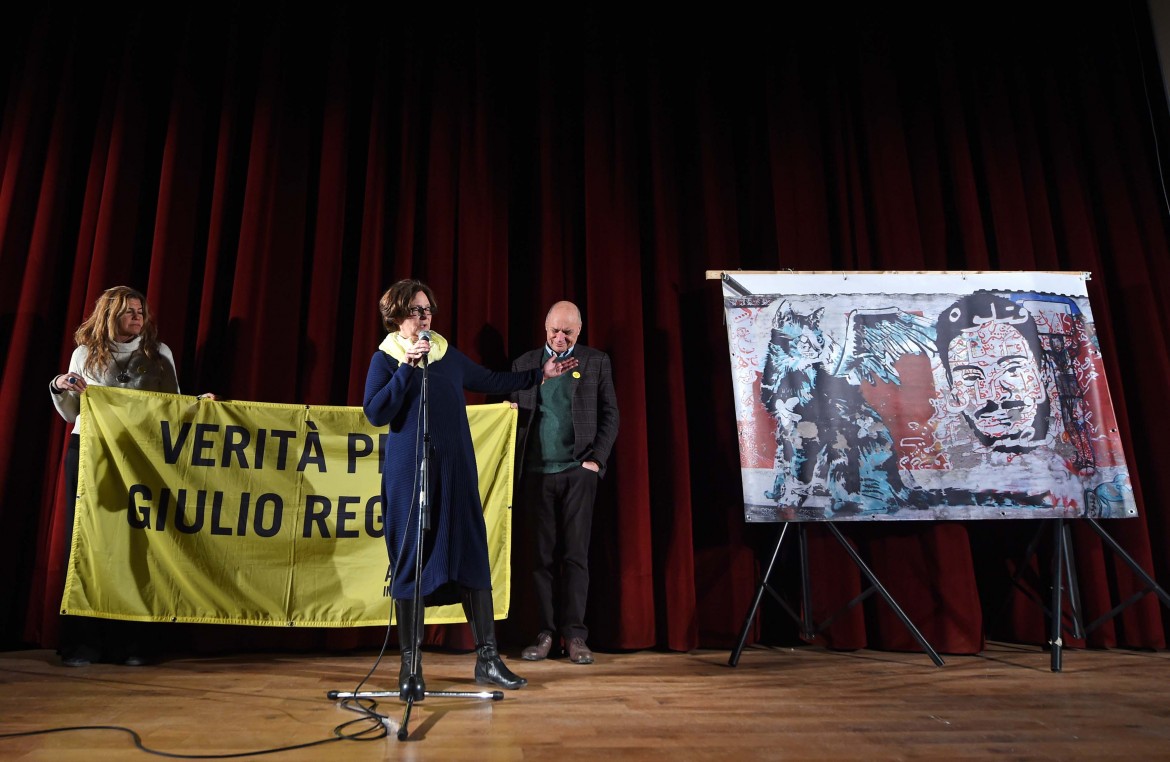Reportage
Memorial marks 2 years since Giulio Regeni was killed with impunity
Hundreds gathered in a theater to remember Giulio Regeni and renew the demand for justice for his murder in Egypt.

It is 7:41 p.m., and hundreds of candles are lighting up the Piazzale dei Tigli. There are so many people here, many more than just those who live in Fiumicello. Paola Defendi, Giulio Regeni’s mother, is the one to give the starting signal for this emotionally overwhelming moment. Two years after the disappearance of the young researcher, people had already started gathering for the event a little before 6:30, outside the Ugo Pellis Middle School, where Regeni himself was a student. Some people have come from the neighboring provinces, and some from even farther away. Among many ordinary people, there are also familiar faces from the realm of culture, entertainment, journalism.
Do the people in Rome know what’s going on? Have they seen what mobilization there was today? —Paola Defendi
“It is an essential day, one of great importance,” said Giuseppe Giulietti, the president of the national body of the FNSI (the Italian National Press Federation, the trade union of Italian journalists). “But after this Jan. 25, we have to follow it up on the 26th, 27th, and on all the other days in the calendar. We can obtain truth and justice only by continuing to demand them, otherwise the public and the media attention towards Giulio’s case will be lost, and also—as his parents are saying, in an extraordinary example of civic responsibility—toward all the Egyptian Giulios who are disappearing and losing their lives every day.”
There are many young people here, and children too. They are the ones who start a silent procession, crossing through all of Fiumicello: the Camminata dei Diritti (“Walk of Rights”) organized by the Governo dei Giovani (Government of the Youth). From time to time, they stop and read from the U.N. Convention on the Rights of the Child, which is, in the end, nothing less than a revision of the Constitution, rethought and adapted according to their sensibility and point of view. The words “rights” and “peace” ring out in the streets, like an echo of something that should have been there already, and at the same time still needs to be fought for and won.
Among the many bearing yellow banners, as the procession of the adults starts, together with Regeni’s parents, we see Pif (Pierfrancesco Diliberto, an Italian television host and actor). “I come from such a city as Palermo,” he says, “where every day you are confronted with memory, with the need to not forget. But coming here, visiting Giulio’s house, seeing the places where he lived, getting to know his parents, you get the feeling that at any moment he will come home. Unfortunately… But it really strikes you, to be here, at his house.” Farther away, keeping to himself and almost hidden in the crowd, we see Valerio Mastandrea, who looks like the cold is getting to him. Later, at around 8:30, he will be the one to read from Regeni’s writings to the large audience, listening, captivated. He reads Regeni’s thoughts with eloquence, but also with great emotion.
“Giulio’s parents,” Mastandrea tells us, “just like the family of Stefano Cucchi or the sister of Giuseppe Uva, reacted to these injustices with an attitude that only those who judge these events superficially can see as merely a reaction stemming from the fact that they are his parents. They—not us—are the ones who showed that they were able to make an injustice into a collective heritage, and at the same time they show the inability of politics to grasp the human and cultural aspect of these tragedies, to know how to take these up and transform them. These people, who are able to get so many other people involved throughout Italy, have a sense of the injustice of these tragedies that is on a higher level than the institutions. The Regeni family, the Cucchi family and all the others, they aren’t just demanding the truth for their loved ones, but for all the similar tragedies that are repeating themselves every day—not only in Egypt, where young people like Giulio are disappearing and dying each day, but also here, in our country.”
At the end, we hear the words of Defendi, who addresses the great crowd that has gathered at the Fiumicello theater: “Do the people in Rome know what’s going on? Have they seen what mobilization there was today? Whole squares filled with people, all in yellow. So today we will say it again: if we manage to get truth and justice, we will, all of us together, change the whole country. And if we can manage this, it will be thanks to none other than Giulio, who keeps giving us strength and courage to achieve this goal.”
Originally published at https://ilmanifesto.it/a-fiumicello-per-giulio-e-per-tutti-i-giulio-che-ogni-giorno-spariscono-in-egitto/ on 2018-01-26
